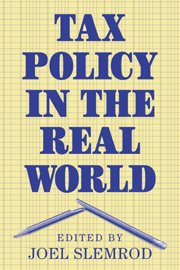Book contents
- Frontmatter
- Contents
- List of contributors
- 1 The real world of tax policy
- 2 Federal tax reform
- 3 Federalism and subfederal taxes
- Threading the fiscal labyrinth: some issues in fiscal decentralization
- A policymaker's guide to fiscal decentralization
- Fiscal decentralization and economic development
- Federalism and reductions in the federal budget
- Issues raised by the new federalism
- Fiscal equalization and school finance
- The case for equalizing aid
- Fiscal equalization: an empty box?
- How would you know a good economic development policy if you tripped over one? Hint: don't just count jobs
- Jobs, productivity, and local economic development: what implications does economic research have for the role of government?
- 4 Principles, politics, and the professors
- Index
Federalism and reductions in the federal budget
Published online by Cambridge University Press: 01 June 2010
- Frontmatter
- Contents
- List of contributors
- 1 The real world of tax policy
- 2 Federal tax reform
- 3 Federalism and subfederal taxes
- Threading the fiscal labyrinth: some issues in fiscal decentralization
- A policymaker's guide to fiscal decentralization
- Fiscal decentralization and economic development
- Federalism and reductions in the federal budget
- Issues raised by the new federalism
- Fiscal equalization and school finance
- The case for equalizing aid
- Fiscal equalization: an empty box?
- How would you know a good economic development policy if you tripped over one? Hint: don't just count jobs
- Jobs, productivity, and local economic development: what implications does economic research have for the role of government?
- 4 Principles, politics, and the professors
- Index
Summary
INTRODUCTION
Our national constitution incorporates built-in tensions of economic federalism, enumerating certain powers for the central government while reserving others for the states. The historical resolution of these tensions has a complex political and economic history. Given the substantial inertia that is built into the U.S. federalism system, it is not surprising that the current set of economic responsibilities has evolved only slowly during the past two centuries.
Almost 15 years ago, it appeared that a new period in federal relations would begin when the Reagan administration proposed to reverse the long-term trend toward the centralization of financing of government services. The Reagan proposal sought to return to states and localities all financial responsibility for income redistribution (Aid to Families with Dependent Children (AFDC) and food stamps) as well as control over more than 60 federal programs targeted to low-income households, including education, community development (e.g., water and sewer programs), transportation, and social services. This was to be accomplished, in part, by a cut in specific grant programs and, in part, by the consolidation of other programs into a single block grant program.
The Reagan federalism initiatives forced a serious rethinking of the evolutionary path of the public economy, which had moved the financial and managerial responsibility for public goods and services steadily upward to the national level. While the core reforms of the Reagan “New Federalism” proposal never became law, the Reagan budgets significantly curtailed the levels of federal support for state and local governments.
- Type
- Chapter
- Information
- Tax Policy in the Real World , pp. 179 - 192Publisher: Cambridge University PressPrint publication year: 1999
- 1
- Cited by



